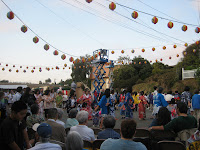
I attended the Obon Festivals at the Vista and San Diego Buddhist Temples (picture above) this summer. I had a very good time! Although I don't regularly attend their services, I enjoy going to the festivals whenever I can. Obon is my favorite Buddhist festival! Often it's held in conjunction with the temple bazaar, which means lots of shaved ice, chicken teriyaki, and red bean jam buns! Yum! Also there is the traditional circle dancing around a yagura, a center stage. Many of the dances are very old, and the movements mime the work that was common to Japanese laborers over a century ago, such as coal-mining (I wonder, if a hundred years from now, there will be a "Cell-phone talk-and-drive Uta"? Or "Blackberry Ondo"?) Very few are "experts" at dancing, but it is all part of the fun! Obon is often called "The Festival of Joy."
O-bon is also known as the "festival of the dead." This is when many Japanese and Japanese-American Buddhists traditionally celebrate the memories of their ancestors. In Japanese culture, the spirits of the dead are said to return during the summer months to visit their relatives still on earth. At the end of Obon, they dutifully depart, until next year's festival, symbolized by the floating lanterns placed in streams and rivers. Obon has its roots in the Ullambana Sutra, a Buddhist scripture which tells the story of the Buddha's disciple, Maudgalyayana (in Japanese, Mokuren), who saved his mother from the Hell Realms. To save her, he asked the Sangha to make gifts of food and water. In joy at his success, he and the villagers danced for joy, which is said to be the origin of the Obon dance. Ullambana is also celebrated in other countries influenced by Buddhism. In turn, the Obon festival may also have incorporated elements of native ancestor veneration.
Obon, rather than being a sad and grim reminder of people who have died, is one of the best festivals in the Buddhist calendar. Family members come together to eat together, dance together, and renew friendships; also, non-Japanese and non-Buddhists attend from the local community and participate in the dancing! Obon is more than a religious event, it is also a celebration of community and culture. Obon is joyous!
Obon reminds us of one of the truths of Buddha-Dharma: all things are without a permanent self. Our physical bodies will inevitably decay and die. Obon also teaches us another of the great truths: we are all interconnected. When we celebrate Obon, we celebrate our families, friends, and our communities. We recall the dead and express gratitude for their lives. They are never far from us.
A fundamental aspect of military life is also to never forget our fallen comrades. We also commemorate them with memorial services, the table set for the POW/MIA in galleys and chow halls, and in many other ways. We may have known them personally; others we never met at all. This does not lessen our gratitude for their sacrifices. As with Obon, we never met our ancestors! But we are no less respectful and grateful for their sacrifices, who have made us what we are today. During this Obon season, let us commemorate our ancestors, related to us through blood: by genetics and by service.



No comments:
Post a Comment